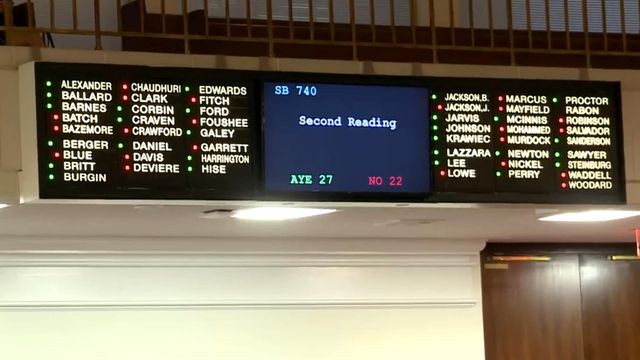NC House, Senate pass new partisan voting district maps
State House and Senate lawmakers voted on party lines Tuesday to approve new voting maps for state House and U.S. House. The maps have been shown mathematically to be heavily biased toward majority Republicans.
Posted — UpdatedHouse lawmakers voted 67-49 to approve new House districts less than 24 hours after the final map was unveiled in a House committee Monday night.
The rating estimated the map would produce 70 Republican districts and 50 Democratic districts. They rated 17 districts, many of them Democratic districts, competitive, making it likely that the map could restore the veto-proof majority House Republicans lost in 2018, which would leave Democratic Gov. Roy Cooper with little leverage for the last two years of his term in office.
The Princeton analysis also showed that the new House map will likely result in fewer districts likely to elect minority lawmakers, which could be in violation of state and federal law.
The state Senate passed that map Tuesday evening, also on strict party lines, 27-22.
Both still have to pass the opposite chamber, but that isn't expected to be problematic. Redistricting requires only a majority vote, which the GOP holds in both chambers. The state constitution does not allow the governor to veto voting maps.
Throughout the process, Republican leaders Rep. Destin Hall, R-Caldwell, and Sen. Ralph Hise, R-Mitchell, have repeatedly said they did not consult political or racial data while drawing the maps.
Democrats have been skeptical, noting the outsized partisanship of the GOP-drawn maps.
"We know that it's highly improbable that a map, without considering partisan performance, could possibly result in a map that's 11-3," Senate Minority Leader Dan Blue said. "Don't just trust my opinion that this is highly improbable. All the mathematical models say that it is highly improbable."
Political gerrymandering is not illegal. But in 2019, a three-judge panel ruled unanimously that extreme partisan gerrymandering violates the North Carolina constitution because it does not allow for "free" elections. They threw out the maps in place at the time and required lawmakers to redraw them.
House Democrats asked Republicans to reconsider their partisan strategy.
"There's parts of this political process we're just sick of, and maps are a way that we encourage a lot of the badness in our political process," House Minority Leader Robert Reives warned.
"If we do things that continue to encourage separating into camps, then that's how our communities will go," Reives, D-Chatham, added. "Talking to Democrats, talking to Republicans, they're just tired. They don't want us governing from the edges. They want us governing from a different place in a different way, and one way to do this starts with these maps."
Blue, D-Wake, urged Senate Republicans to follow the Golden Rule.
"At some point, we have to be willing to exercise those basic core beliefs. We have to put down the urge to increase political power at all costs," he said.
Republicans didn't respond to the criticisms, except to repeat that they did not use political or racial data to draw the maps.
On Wednesday, the Senate will vote on new Senate districts, which passed a redistricting committee Tuesday morning, also on party lines. On Thursday, it's expected to vote on the House maps.
The House Redistricting committee is scheduled to consider the congressional map on Wednesday afternoon, as well as the Senate map expected to pass the Senate in the morning. Votes on both are scheduled on the House floor Thursday.
• Credits
Copyright 2024 by Capitol Broadcasting Company. All rights reserved. This material may not be published, broadcast, rewritten or redistributed.






